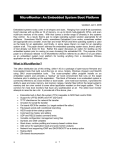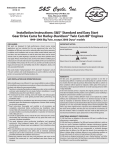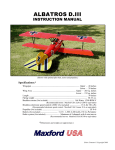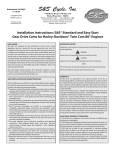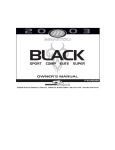Download Woodstock THE SHOP FOX W1500 Specifications
Transcript
The Shop Fox® ITEM W1500 P.O. Box 2309 Bellingham, WA 98227 COPYRIGHT © 1995 BY WOODSTOCK INTERNATIONAL, INC. REG.# VA 742-641 WARNING: NO PORTION OF THIS MANUAL MAY BE REPRODUCED IN ANY SHAPE OR FORM WITHOUT THE WRITTEN APPROVAL OF WOODSTOCK INTERNATIONAL, INC. REVISED APRIL 1998, PRINTED IN TAIWAN TABLE OF CONTENTS I. Introduction ..........................................................................................................................................2 A. Safety Instructions for all Tools .............................................................................................2 B. Additional Safety Rules for The Shop Fox® ..........................................................................3 C. Commentary............................................................................................................................4 D. Piece Inventory .......................................................................................................................4 II. Assembly..............................................................................................................................................5 A. Lock Knobs .............................................................................................................................5 B. Clamping Mechanism .............................................................................................................5 C. Angle Bracket .........................................................................................................................6 III. Adjustments .........................................................................................................................................7 A. Sliding Table ...........................................................................................................................7 B. Hold-Down Bracket ................................................................................................................7 C. Face Plate ................................................................................................................................8 D. Miter Bar .................................................................................................................................8 E. Parallelism ..............................................................................................................................9 IV. Set-Up ..............................................................................................................................................10 A. Planning ................................................................................................................................10 B. Clamping your Work ............................................................................................................10 C. Horizontal Clamping ............................................................................................................10 D. Vertical Clamping .................................................................................................................11 E. Other Clamping Methods .....................................................................................................11 F. Clearance ..............................................................................................................................12 V. Operations ..........................................................................................................................................13 A. General Procedures ...............................................................................................................13 B. Horizontal Work ...................................................................................................................14 C. Vertical Work .......................................................................................................................15 D. Angled Work ........................................................................................................................15 VI. Closure ..............................................................................................................................................16 VII. Specifications .....................................................................................................................................17 VIII. Part Diagram ......................................................................................................................................18 IX. Part List ..............................................................................................................................................19 X. Warranty ............................................................................................................................................20 Shop Fox® -1- SECTION I: INTRODUCTION WARNING: For Your Own Safety, Read Instructions Before Using The Shop Fox® • Always wear eye protection • Keep fingers away from rotating cutters • Always feed against the rotation of the cutter • Do not use awkward hand positions • Use overhead guard when fence is not in place A. Safety Instructions For All Tools These safety rules cannot cover every situation in a workshop. Consider your individual workshop conditions when setting up or operating any machine. 1. KNOW YOUR POWER TOOL. Read the owner’s manual carefully. Learn the tool’s applications and limitations, as well as its particular hazards. 2. KEEP ALL GUARDS IN PLACE and in working order. 3. GROUND ALL TOOLS. If an adapter is used to accommodate a two-prong receptacle, the adapter plug must be attached to a known ground. Never remove the grounding prong. 4. REMOVE ADJUSTING KEYS AND WRENCHES. Make it a habit to check that keys and adjusting wrenches are removed from the machine before turning it on. 5. KEEP WORK AREA CLEAN. Cluttered areas and benches invite accidents. 6. AVOID DANGEROUS ENVIRONMENTS. Do not use power tools in damp or wet locations or expose them to rain. Keep your work area well lighted. -2- 7. KEEP CHILDREN AND VISITORS AWAY. All children and visitors should be kept a safe distance away from your work area. 8. MAKE WORKSHOP CHILD-PROOF with padlocks, master switches, or by removing starter keys. 9. DO NOT FORCE TOOL. Tools work better and more safely when they are allowed to work at their own speed. 10. WEAR PROPER APPAREL. Do not wear loose clothing, gloves, neckties, or jewelry that might get caught in moving parts. Non-slip footwear should be worn. Wear a hat or other protective head wear if your hair is long. 11. NEVER STAND OR LEAN ON TOOL. 12. USE SAFETY GLASSES AND EAR PROTECTION. Also use a DUST MASK if the cutting operation is dusty. Shop Fox® 13. DO NOT OVERREACH. Keep proper footing and balance at all times. 14. MAINTAIN TOOLS IN TOP CONDITION. Keep tools sharp and clean for best and safest performance. Follow instructions for lubricating and changing accessories. 15. DISCONNECT TOOLS FROM POWER before servicing and when changing accessories, such as blades, bits, and cutters. 16. AVOID ACCIDENTAL STARTING. Make sure the switch is in the “OFF” position before plugging in the cord. 17. CHECK DAMAGED PARTS. Do not operate the machine until you are certain it is in perfect running condition. 18. NEVER LEAVE THE TOOL RUNNING UNATTENDED - TURN POWER OFF. Do not leave the tool until it comes to a full stop. 19. DO NOT OPERATE THE TOOL IF USING DRUGS, ALCOHOL, OR MEDICATION. 20. DO NOT WORK IN HASTE or operate machine if you are mentally or physically fatigued. 21. IF THERE IS SOMETHING YOU DO NOT KNOW OR UNDERSTAND, DO NOT OPERATE MACHINE! Ask for help first. Confusion is dangerous. 22. BAD HABITS ARE DANGEROUS. Review all safety procedures often. B. Additional Safety Rules For The Shop Fox® 1. Feed against the rotation of the cutter, saw blade, or sanding tool. Caution: Be aware when you reverse the rotation on a machine like a shaper. 2. Cut end grain before putting an edge all the way around any stock such as a table top, raised panel, or rail end. 3. Guard against grain tear out by placing a scrap piece behind the work so the cutter exits through it as the workpiece clears the bit. 4. Use quality material. Wood that is cupped, warped, bent, or split will not machine properly and is dangerous. Do not shape loose material such as knots. 5. Wear the appropriate ANSI approved safety equipment for eyes, face, ears, and lungs. 6. Check all devices that hold cutting tools in place, i.e. router collets, shaper spindles, moulding head gibs and arbor nuts. 7. Always use sharp cutting tools. Shop Fox® 8. Plan your work. Figure your steps out before you start machining. 9. Do not shape material that is too small to be clamped securely, even for the Shop Fox®. 10. Make sure that all fasteners such as the cap screws are not loose. Tighten them if necessary. 11. Make sure all clamps, jigs, and fixtures associated with the Shop Fox® and other tools are clear of the cutting tool. It is imperative that all clamping methods be done correctly and inspected for proper clearance. 12. Make sure your workpiece is solidly supported and all clamps are secure. Unstable work may kick-out during the cutting process if not properly secured to the Shop Fox®. When adjusting the Shop Fox® or stationary machine, always turn the machine off, make sure it has come to a complete stop and pull the plug from the outlet or interrupt power at the disconnect switch BEFORE performing such duties. -3- C. Commentary D. Piece Inventory The Shop Fox® is a multi-functional accessory fixture which can be used in conjunction with a router table, horizontal borer, shaper, bandsaw, table saw, sander, and various other woodworking machines. Its purpose is to help cut, shape and sand wood, wood composites, and plastics. The Shop Fox® combines conventional clamping methods with unique positioning features to assist in cutting tenons, mortises, rail ends, finger joints, glue joints, and other joints used in woodworking as well as making edge mouldings and raised panels. Remove the Shop Fox® from the package. You may want to save the carton in case of return or future storage. Woodstock International is committed to offering top quality products and supporting its products through customer service and technical documentation. This manual represents our latest effort to produce the best documentation possible. If you have any criticisms or comments you feel we should consider in our next printing, please write or fax to: Technical Documentation Woodstock International, Inc. P.O. Box 2309 Bellingham, WA 98227 FAX 1-800-647-8801 Phone 360-734-3482 If you have any parts problems or requests, please contact your Woodstock distributor. They will be happy to assist you. -4- You will notice that most of the Shop Fox® has been preassembled at the factory and little assembly is required on your part. Compare the Shop Fox® to the parts list in the back of this manual to ensure that you have all the pieces. Upon removal of all items from the package, you should have: 1. 2. 3. 4. 5. 6. 7. 8. 9. 10. 11. Shop Fox® Upper Unit Shop Fox® Lower Unit Lock Knobs (2) Clamping Assembly Angle Stop Clamping Stud W/ Rubber Foot Thumb Screws (2) Aluminum Spacers (2) 1 /4'' Flat Washer (2) Wing Nuts (2) Allen® Wrenches (2) After you have completed your inventory, inspect all the parts (especially the contact areas) for burrs and other irregularities which might hinder the assembly process. If you find any burrs left over from the machining process, simply sand or file them flat. Please note that while burrs are not a common occurrence, it is possible that one or more of the parts could have been missed during the manufacturing process. Shop Fox® SECTION II: ASSEMBLY B. Clamping Mechanism A. Lock Knobs To secure the Shop Fox® assembly to the base plate: 1. 2. Thread each of two (2) lock knobs into the lock knob brackets mounted on the base plate. Figure 1. Tighten sufficiently to hold the Shop Fox® to the base plate. Figure 1. Lock knob installation. To attach the horizontal clamping mechanism to the Shop Fox®: 1. Press the rubber clamping pad onto the head of the 2" carriage bolt. 2. Thread the carriage bolt into the toggle clamp. Figure 2. 3. Tighten the lock nut against the toggle clamp shoulder. Adjustment is made by loosening the lock nut and turning the carriage bolt in or out of the toggle clamp and then re-tightening the lock nut. Lock Nut Rubber Pad Figure 2. Threading the clamping pad into the toggle clamp. Shop Fox® -5- Clamping Mechanism Continued 4. Snap the toggle clamp bracket onto the inside vertical plate of the Shop Fox®. Figure 3. 5. See page 7 for ball-plunger adjustment. Figure 3. Mounting the clamping bracket to the Shop Fox®. C. Angle Bracket The Shop Fox® Face Plate features a variety of predrilled holes for mounting the angle bracket. The Angle Bracket is adjustable and supports your workpiece at a variety of angles. To mount the Angle Bracket: 1. Slide the aluminum bushing onto the thumb screw and insert the thumb screw through one of the end holes in the angle bracket. Figure 4. 2. Slide the thumb screw with angle bracket into the bottom hole located in the middle of the face plate. Slide on a washer and thread on the wing nut. 3. Repeat this process on the other end of the angle bracket so the thumb screw passes through the arc cut-out. 4. If making angled cuts between -45° and +45°, transfer the angle with a bevel gauge to the angle bracket and tighten the thumbscrews and wing nuts. 5. If making either -45°, 90° or +45° cuts, mount the angle bracket into any of the fixed position holes with both sets of thumbscrews, bushings, washers and wing nuts. Figure 4. Mounting the Angle Bracket to the Shop Fox®. -6- Shop Fox® SECTION III: ADJUSTMENTS A. Sliding Table B. Hold-Down Bracket Ensure that the Shop Fox® slides freely on the base plate assembly. Figure 5. The hold-down bracket should slide easily across the face plate when installed correctly and not fall off. However, you should be able to remove it without further adjustment of the ball-plunger. To Test: 1. Place the Shop Fox® in any 3/8" x 3/4" miter slot, i.e.: your table saw or shaper. WARNING: Disconnect tool from power source before testing. 2. Push the sliding table forward and backward by gripping the hand-holds. 3. If you have difficulty moving the sliding table from front to back, remove the sliding table assembly from the base plate assembly. 4. Check for burrs, dirt, grit, etc. Clean, file, or sand where appropriate and re-test until a smooth action is obtained. 5. If there does not appear to be any foreign material, check that the anti-friction tape is correctly applied. Shop Fox® To Adjust the Hold-down Bracket: 1. Loosen the ball-plunger so the hold-down bracket fits loosely on the face plate. 2. With the hold-down bracket in position on the face plate, tighten the ball-plunger. Stop tightening when there is slight resistance to sliding the holddown bracket across the face plate. 3. Turn the Shop Fox® over to see if the hold-down bracket falls off. If it falls off, tighten the ballplunger a bit more. 4. Try to pull the hold-down bracket off the face plate. It should snap off with a light click. If it does not come off without excessive force, loosen the ball-plunger slightly and try again. Once the ball-plunger is properly adjusted, you should be able to snap the hold-down bracket on, clamp your workpiece effectively, and then snap it off when not in use. -7- C. Face Plate D. Miter Bar The Shop Fox® is a precision right angle fixture and should be exactly perpendicular to your table surface. The miter bar is made to fit standard 3/8" x 3/4" miter slots. Some machine manufacturers will deviate from this standard, however, and some slight modification of either the bar or the slot will be necessary. To check the accuracy of the Face Plate: 1. Place the Shop Fox® in an appropriate miter slot and place a high quality machinist’s square against the table and face plate. Figure 5. 2. If the face plate is not 90° to the table surface, determine whether it is pitching toward or away from the table surface. 3. Loosen the six (6) cap screws that secure the two hand holds to the sliding table. Pitch the face plate in the desired direction by the degree necessary for a perfect 90° angle. Do not loosen the face plate screws. Keep the hand hold and face plate screwed tightly together so no compounding errors occur. 4. Shim accordingly and re-tighten the cap screws. 1. Fit the miter bar in the miter slots of each of your machines. For each machine, note whether the fit is tight or loose. Hint: make modifications to your miter bar or slots only after you have tested each one. If, for example, the bar fits into 3 of your machines perfectly, but it is too tight in the fourth machine, then you should modify the width of the fourth miter slot. It would be counterproductive to alter the bar to fit the fourth slot because then it would no longer fit in the other three slots. You will only know this after testing all the relevant machines. 2. If the bar feels loose: a. Measure the clearance with a 0.005" feeler gauge. 5. Recheck with a machinist’s square. b. If the feeler gauge will fit between the bar and the slot, make a series of light punch marks along the side of the bar or the slot, depending on which you have decided to alter. c. If the resulting fit is too tight, brush the punch marks lightly with emery cloth or fine file. This should fine-tune the fit of the bar. 3. If the bar is too tight or does not fit at all: a. Use a fine file to make sure there are no dings or burrs on the bar or in the slot. b. If the bar still binds, remove more material either from the bar or the miter slot. Figure 5. Checking for square. -8- Shop Fox® E. Parallelism Alignment of the miter bar parallel to the front edge of the base plate is important for optimum performance. Two methods of adjustment are described here. Method 1: 1. Loosen the two (2) mounting screws that secure the miter bar to the base plate. 2. Measure the distance from the front edge of the base plate to the front edge of the miter bar, working from side to side until both the left and right measurements are equal. Figure 6. 3. Secure the mounting screws and double check your measurements. Method 2: 1. Obtain a dial indicator with magnetic base. 2. Place the Shop Fox® on the machine table with the miter bar in the miter slot. 3. Place the dial indicator against the front edge of the base plate. 4. Loosen the two miter bar mounting screws slightly and slide the Shop Fox® back and forth in the miter slot. 5. Note the deviation from end to end on the dial indicator. Begin shifting the Shop Fox® to reduce the deviation indicated on the dial. As the miter bar gets closer to being parallel with the front edge of the base plate, begin snugging down the mounting screws from above. Final tuning may then require tapping the jig with a light mallet. Once the deviation indicated on the dial is within 0.002" to 0.003" from end to end, tighten the mounting screws securely and recheck your measurement one last time. Your Shop Fox® is now ready to produce square cuts and tight fitting joints. Figure 6. Checking for parallel. Shop Fox® -9- SECTION IV: SET-UP A. Planning C. Horizontal Clamping Enough cannot be said about proper planning during any project. A job thoroughly planned is a job almost done. Go through the operational steps necessary to complete your project and determine which steps may benefit by using the Shop Fox®. It helps to number all your parts and pieces. We also recommend that you have plenty of scrap material on hand so that you can make periodic tests before cutting, machining, or sanding your actual workpiece. Use the sliding hold-down bracket and toggle clamp to hold work flat against the sliding table as shown in Figure 7. Place your work inside the Shop Fox® and adjust the toggle clamp to yield adequate clamping pressure. Support the horizontal workpiece against one of the hand-holds for maximum stability. Remember to clamp your workpiece securely so it does not move during the cutting operation. Use enough clamping pressure to hold the workpiece in place. However, excessive clamping pressure may mar the workpiece or distort the hold-down bracket. When machining softer woods, place a protective block between the clamp and the workpiece. Planning also includes making sure your shop is clean, that you have the necessary clearance for the stock you are processing, that there is enough lighting to see what you are doing, and that you have reviewed all of the safety rules concerning your project and the machines that will be put to use. B. Clamping your Work The advantages of using the Shop Fox® include precision positioning and versatile clamping to yield safer, more accurate results. Of course, every clamping method cannot be covered in this manual. Some methods will only become apparent during special applications. The primary consideration when clamping is to make sure the workpiece is held safely for all machining operations. Ensure that your workpiece will not kickout from under your clamping set-up when cutting pressure is applied. Do not clamp work in the Shop Fox® in such a way that the angle of attack is so extreme that kick-back will likely result. We will cover basic clamping methods on the following pages. Backing Block Figure 7. Horizontal clamping with backing block in place. The backing block will protect against tear out. CAUTION: Always use two clamps for any workpiece clamped solely to the face plate. -10- Shop Fox® D. Vertical Clamping E. Other Clamping Methods There are many ways to clamp your workpiece to the face plate of the Shop Fox®. However, when clamping your workpiece vertically to the face plate, always use two clamps. With a little bit of ingenuity you will find that there are numerous other ways in which to hold your workpiece to the Shop Fox®. C-clamps, bar clamps, toggle clamps, and other holding devices will give you the flexibility to create many innovative ways to hold your workpiece in position. Refer to the photos in this manual for some ideas on other clamping methods. 1. There are 3/8" pre-drilled holes that accept our W1301 6" Vice Clamp (not included). These holes are strategically located on the face plate so you can position your workpiece and clamp it from any direction. Figure 8. 2. There are slots milled into the top edge of the face plate to accept bar type clamps (not included). Figure 9. 3. Standard C-clamps can be used anywhere on the face plate to secure your workpiece. Figure 10. CAUTION: Do not clamp work with squeeze or speed type bar clamps.They do not have enough torque to hold the workpiece adequately. The 3/4" angle bracket included with the Shop Fox® is used to support and position a vertical workpiece at any angle between ±45° and 90°. Figure 9. Angled clamping for miter joint set-up. Figure 8. Vertical clamping for tenon cutting. Figure 10. Angled clamping for spline jointing on a table saw. Shop Fox® -11- F. Clearance Even though there are many ways to affix your workpiece to the Shop Fox®, there is one thing in common with all of these arrangements. You must have the proper clearance between the Shop Fox®, the clamps and the cutting/sanding tool. It is imperative that all clamping methods be done correctly and inspected for proper clearance. Make a trial run with the power off and the plug pulled. It only takes a few seconds to do this and is well worth the effort. WARNING: When adjusting the Shop Fox® or stationary machine, always turn the machine off, make sure it has come to a complete stop and pull the plug from the outlet or interrupt power at the disconnect switch BEFORE performing such duties. -12- Figure 11. Testing for clearance. Shift clamps if they come close to contacting the cutting tool. Shop Fox® SECTION V: OPERATIONS A. General Procedures You will find that using the Shop Fox® with a table saw or shaper is a real time saver for positioning and holding your work effectively and safely. Many cuts and operations that you thought were impossible with traditional clamping methods are now accomplished with ease. Whether you use the Shop Fox® for machining work horizontally or vertically, the same principle applies. The Shop Fox® is positioned so the miter bar travels in the miter slot. The sliding table can be infinitely adjusted within its range toward or away from the cutting tool and then locked in place. These features, along with the fact that the Shop Fox® has a perpendicular face plate and many clamping options make it truly versatile. Figure 12. Crosscutting. Use the Shop Fox® for jobs requiring ultra precision. The Shop Fox® is designed for woodworkers of all skill levels. If you are a beginning woodworker, gather as much information as you can and understand all of the safety procedures about woodworking, especially relating to your particular operation. There are plenty of informational sources available; from television, books, and videos to the school shop instructor or woodworking club in your area. Do not jump right in and attempt to perform something beyond your capabilities. Instead, start by completing simple projects to gain the experience necessary to proceed to more complex tasks. No matter what your skill level, always practice good safety procedures and follow the recommendations listed in this manual. Before you begin, make sure you fully understand your capabilities and that you have a complete understanding of your table saw, shaper, or sander and the inherent hazards associated with them. General operating procedures are just that - general in nature - they are not the final word on performing any one of the many functions possible with the Shop Fox®. Shop Fox® Figure 13. Using the Shop Fox® on a belt sander. -13- B. Horizontal Work To position the workpiece in the Shop Fox®: 1. Place your workpiece either face up or face down on the sliding table depending upon application. Position the workpiece, so it touches the side hand hold on the outfeed side. Place as much of the workpiece on the sliding table in order to ensure proper support but leave enough room for clearance of your cutting tool. Start the machine and wait until it comes up to full speed before you start your cut. Firmly grasp the hand holds and gently feed your workpiece into the cutting tool and continue at a steady, even rate. This is somewhat subjective due to the type of wood, thickness, how much stock is being removed, and other factors. Use the utmost care and good judgement in performing any machining operation. Start the cut slowly to reduce the severity of impact when the cutting tool enters the wood. Make multiple passes, removing more material each time before making the final cut. Not only is it safer – your cutting tools will last longer too. 2. Adjust the sliding toggle clamp so there is adequate clamping pressure and center it over the workpiece. It may be necessary to add one or more auxiliary clamps in order to hold the workpiece in position. 3. When shaping or sanding end grain, you should use a piece of scrap wood of similar thickness on the exit side of the workpiece. This reduces the possibility of chip-out on the edge of the board. After you have clamped and secured everything in position and have adjusted the Shop Fox® for the proper distance to the cutter, make a dry run so you can see exactly where the machining is going to take place. CAUTION: Check again to make sure that all devices holding the workpiece in position clear the cutting tool with plenty of room to spare. Collets, arbors, cutters or blades must be secure in your machine. Ensure that all safety devices needed for your particular operation are in place and are completely functional. -14- Figure 14. An example of horizontal work: making a rabbet joint with a dado head. Shop Fox® C. Vertical Work D. Angled Work You can locate your workpiece in many positions on the face plate depending upon your requirements. When holding the stock vertically on the face plate, use the 90° angle bracket to support the work on the exit side. If you change cutter rotation, the 90° angle bracket must be moved to the opposite side of the face plate in order to support the work on the exit side. We also recommend placing a backing block between the angle bracket and the workpiece to back up the workpiece and reduce the risk of tear out. Always use a minimum of two clamps for vertical work. You can position your workpiece anywhere from 90° vertical to 45° left or right from vertical on the face plate. Figure 16. This is particularly useful when angle slotting or cutting angled tenons. Always use a minimum of two clamps to secure angled work. Figure 17. Using a bevel gauge for setting up angled work. Figure 15. An example of vertical work: using the Shop Fox® for making tenons on the table saw. Figure 18. Cutting a lap miter joint with a shaper. Figure 16. Making a splined dovetail joint with a router bit. Shop Fox® -15- SECTION VI: CLOSURE The following pages contain a part diagram, part list and general specifications. If you need parts or help in assembling your Shop Fox®, or if you need operational information, we encourage you to contact your Woodstock distributor. They will be happy to help you. If you have any comments or concerns dealing specifically with this manual, please write or fax to: Technical Documentation Woodstock International, Inc. P.O. Box 2309 Bellingham, WA 98227 FAX 360-671-3053 We would like to stress that we have included some important safety measures that are essential to this tool’s operation. While most safety measures are generally universal, Woodstock reminds you that each workshop is different and safety rules should be considered as they apply to your specific situation. -16- WARNING: There is danger associated with using the Shop Fox® in conjunction with any power tool. Use the tool with respect and caution to lessen the possibility of mechanical damage or operator injury. If normal safety precautions are overlooked or ignored, injury to the operator or others in the area is likely. Your Shop Fox® was specifically designed as an aid to cutting and shaping operations. It must never be modified and/or used for any application other than that for which it was designed. DO NOT MODIFY AND/OR USE THIS FIXTURE FOR ANY OTHER PURPOSE. Modifications or improper use of this fixture will void the warranty. If you are confused about any aspect of this fixture, DO NOT use it until your questions are answered. Our Technical Department can be reached by calling 1-800-840-8420 between the hours of 7:00 am to 5:00 pm Pacific Standard Time. Shop Fox® SECTION VII: SPECIFICATIONS MODEL W1500 SHOP FOX® Construction ............................................................ Aluminum Plate and Cast Aluminum Components Depth: Fully Extended .....................................................................................................................................131⁄2" Closed ..........................................................................................................................................8" Width .....................................................................................................................................131⁄4" Height .......................................................................................................................................81⁄2" Net Weight ...................................................................................................................................15 lbs. Miter Bar Slot Size ......................................................................................................................... 3⁄8" x 3⁄4" Hand-holds ...............................................................................................................................45°, Cast Specifications, while accurate, are subject to change without notice. Shop Fox® -17- SECTION VIII: PART DIAGRAM -18- Shop Fox® SECTION IX: PART LIST Shop Fox® PART # DESCRIPTION 1 2 3 4 5 6 7 8 9 10 11 12 13 14 15 16 17 18 19 20 21 22 23 24 25 26 HOLD DOWN BRACKET FACE PLATE SIDE HAND-HOLD (RIGHT) SIDE HAND-HOLD (LEFT) SLIDING TABLE SLIDING TABLE SUPPORT LOCKING KNOB BRACKETS SLIDING RAIL BASE PLATE MITER BAR LOCK KNOBS TOGGLE CLAMP ANGLE BRACKET 10 - 32 x 3⁄8" BUTTON HD SCREWS 1 ⁄4" - 20 x 13⁄4" THUMB SCREWS 1 ⁄4" - 20 WING NUTS 1 ⁄4" - 20 x 1" CAP SCRW 1 ⁄4" - 20 x 1⁄2" CAP SCRW 1 ⁄4" - 20 x 1⁄2" BALL PLUNGER 1 ⁄2" x 1⁄4" x 5⁄8" ALUMINUM BUSHING PLUNGER 5 ⁄16" - 18 HEX NUT 1 ⁄2" TEFLON TAPE 1 ⁄8" ALLEN® WRENCH 3 ⁄16" ALLEN® WRENCH BUTTON HEAD SCREW -19- SECTION X: WARRANTY Woodstock International, Inc. (Woodstock) warrants this product against defects in workmanship and materials for a period of one year from the original date of purchase. We will repair or replace at our option, any part or parts of the product covered under this warranty which, after examination, proves to be defective in workmanship or material during the warranty period. This warranty does not cover repair or replacement due to misuse, abuse, negligence, accidents, un-authorized repairs, alterations or lack of maintenance. This warranty does not cover loss of use of product during repairs —either under warranty or otherwise. Woodstock shall be tried in the State of Washington, County of Whatcom. We shall in no event be liable for death, injuries to persons or property or for incidental, contingent, special or consequential damages arising from the use of our products. Woodstock reserves the right to change specifications at any time as we constantly strive to achieve better quality equipment. We make every effort to ensure that our products meet high quality and durability standards and we hope you never need to use this warranty. This is Woodstock’s sole written warranty and any and all warranties that may be implied by law, including any merchantability or fitness, for any particular purpose, are hereby limited to the duration of this written warranty. We do not warrant or represent that the merchandise complies with the provisions of any law or acts. In no event shall Woodstock’s liability under this warranty exceed the purchase price paid for the product and any legal actions brought against -20- Shop Fox®

























